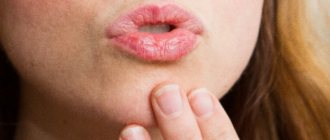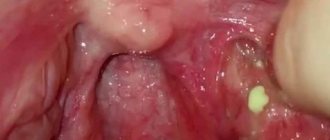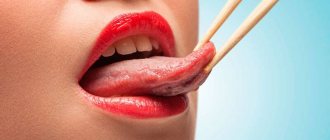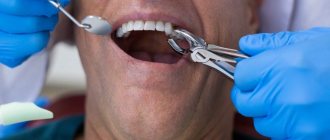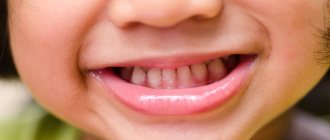Cracks in the corners of the mouth are the main symptom of angulitis. This is a disease of the mucous membrane and skin that develops under the influence of streptococci or yeast-like fungi. Diabetes mellitus, problems with bite, lack of vitamin B2 and even long-term antibiotic therapy also contribute to the occurrence of cracks. Why is the skin in the corners of the mouth prone to cracking, how to neutralize and prevent the development of the process in the future?
General characteristics of the condition
Painful cracks around the mouth are colloquially called jams. Zaeda is one of the forms of stomatitis (damage to the oral mucosa) caused by streptococci or yeast-like fungi of the genus Candida. In some cases, doctors diagnose mixed infection (angular stomatitis).
The following angulitis are distinguished: allergic (when using lipstick or other cosmetics), microbial (streptococcal, candidiasis, etc.) and post-traumatic (postoperative, post-manipulation, etc.). Microbial angulitis most often occurs in patients with diabetes mellitus (streptococcal) or in HIV-infected people (candidomycosis). Microbial angulitis in children can occur due to intestinal dysbiosis, vitamin deficiency, decreased immunity and other diseases. Post-traumatic (postoperative) angulitis is cracks in the skin and mucous membranes (linear tears in the skin or mucous membrane) in the area of the corner of the mouth, resulting from excessive (excessive) stretching after intraoral surgical dental operations (removal of dystopic or impacted wisdom teeth) or manipulations associated with treatment of wisdom teeth. Almost after every removal of an impacted or dystopic wisdom tooth, maxillary sinusotomy or other surgical interventions that require wide opening of the mouth, damage (by stretching) to the surface layers of the skin and mucous membrane in the area of the corner of the mouth occurs, i.e. post-traumatic (postoperative) angulitis.
Morphological features
Streptococcal angulitis most often develops in patients of the younger age category. First, a small bubble appears in the corners of the mouth, covered with a thin film. Later, erosion forms at the site of the bubble, covered with a crust of congealed blood and purulent masses. When the blister is opened, moist red skin with traces of minor bleeding is exposed. You can often find a crack in the center of the bubble. Approximately 1-2 hours after opening, the skin again becomes covered with a dense crust.
Content:
- General characteristics of the condition
- Possible reasons for development
- Features of therapy and prevention
Streptococcal infection of the mucous membrane is accompanied by discomfort and pain when opening the mouth.
Seizures of fungal origin are slightly different from streptococcal ones. Initially, a varnish-red erosion forms on the mucosa, surrounded by an additional layer of epithelium. Sometimes erosion is covered with a grayish coating. A specific crust does not form in case of candidiasis angulitis. Most often, the crack is masked by an overhanging skin fold and has a chronic, relapsing course.
How to treat a cracked lip in the middle: folk remedies
Cracked lip in the middle:
- You need to lubricate the crack with honey . Its softening and bactericidal effect has a beneficial effect on healing. This method is good if you are not allergic to the product.
- Use sour cream and olive oil , adding a couple of drops. Make a mask from this composition and leave it overnight. You can lubricate your lips with butter, and before going out - with Vaseline. By the way, you can prepare your own lip mask from these ingredients, taking three parts oil to one part Vaseline.
- tea tree ether is quite effective . If you add 2-3 drops to almond or peach oil and apply to the wound, healing occurs within a few days. If not, it means that the inflammatory process is developing, and then medical consultation is necessary.
- Mix vegetable oil with kiwi fruit pulp and apply this mixture to your lip for 20 minutes. Rinse off the mixture and dry your lips, and then moisturize them with a special product. If it doesn’t help, use a compress containing vitamins A and E.
- If a small child, especially an infant, has a cracked lip, the reason is most likely due to the composition of the mother’s milk. Therefore, mother should enrich her diet with vitamins. You can lubricate with cream, the main thing is that they do not contain fragrances or dyes.
- Home doctor - aloe flower is a universal healing remedy, including for lip cracks.
- Another universal remedy - tea rose petals, which are recommended even for infants with stomatitis. Soaked in warm milk for half an hour and ground to a homogeneous consistency, they heal cracks well when applied to the lips.
Petals - Echination tincture , and not necessarily from a pharmacy, but also from our own production. Just fill a third of a liter jar with crushed dry echinacea and add alcohol, vodka, moonshine - any strong composition. Leave it to brew for a couple of weeks and take it to boost your immunity before going to bed.
Possible reasons for development
The appearance of a jam indicates not only infection or internal pathological processes, but also the bad habits of the person himself. Regularly licking your lips is a ritual that some people find extremely difficult to break. It is important to understand that regular exposure to saliva, which contains billions of bacteria, has a detrimental effect on the mucous membranes. If a crack has already formed, licking the lips interferes with regeneration and further fuels the infection.
Neglecting the rules of personal hygiene is also fraught with the development of cracks in the corners of the mouth. Possible causes include: microtraumas, lack of cleansing, dirt on the skin.
Eating in childhood most often indicates iron deficiency anemia. Therefore, all pediatricians advise immediately taking a blood test for iron, and not sinning on problems with the baby’s hygiene. The main thing is not to try to correct anemia on your own. Introducing meat and pomegranates in large quantities into the diet can only maintain the existing iron level, but not increase it. Noticed symptoms of anemia? Go to the doctor and undergo a comprehensive therapeutic course.
Cracks in the corners of the mouth can also be a symptom of:
- vitamin B2 deficiency;
- malocclusion;
- missing teeth or incorrectly selected dentures;
- allergic lesions of the oral cavity;
- caries;
- metabolic disorders;
- long-term treatment with strong medications.
What you need to know about chronic recurrent binge eating?
In some cases, therapy gives a short-term effect or does not affect the condition of cracks in the corners of the mouth at all. For frequently recurring seizures, the doctor must conduct a comprehensive diagnosis of the body, identify and eliminate the root cause. What diseases can chronic angulitis indicate?
- HIV. A weakened body becomes easy prey for pathogenic microbes. Most often, cracks cannot be treated, and the surrounding skin becomes covered with a white coating, becomes dry and inflamed.
- Tuberculosis, chronic infectious pathologies. Microtraumas occur due to fungus or mixed flora. Often, recurrent seizures are accompanied by increased night sweats and sudden changes in body temperature.
- Intestinal diseases. Failure of the functionality of the gastrointestinal tract is always associated with disruption of metabolic processes. Intestinal diseases impair the absorption of nutrients, including iron and B vitamins. The lack of these nutrients provokes a decrease in the protective function of the mucous membrane and the development of cracks.
- Diabetes. In diabetes mellitus, an imbalance of mucosal microorganisms occurs. Moreover, by-products of impaired glucose metabolism accumulate in tissues. The result is microtrauma of tissue with a characteristic white coating, which is hidden behind skin folds.
- Oncological diseases. Cancer suppresses the body's protective functions and consumes the lion's share of nutrients, which can lead to a lack of micro- and macroelements and anemia. Recurrent seizures may well be a symptom of a tumor in the oral cavity or gastrointestinal tract.
Treatment
The method of treating angulitis depends on the reasons that provoked its appearance. What to do in the event of the development of a serious pathology - to treat yourself or go to a doctor - is decided by the person himself. In the absence of proper treatment, cheilitis can turn into purulent abscesses.
- Trauma, bad habits. Correct the prosthesis, temporarily avoid going to the dentist, do not perform active actions with the throat and lips, take proper care of the oral cavity, and brush your teeth thoroughly. It is recommended to numb the surface with lidocaine-based solutions. Treat with antiseptics, stimulate healing with rosehip or sea buckthorn oils. It is also not forbidden to use cream for dryness and flaking.
- Leukoplakia. Stop smoking, eliminate spicy foods from your diet. For therapy, use a solution of vitamin A (topically), E, B6 - orally for 30 days.
- Candidiasis. Apply Lamisil cream three times a day to the crack. Consultation with a specialist is recommended.
- Tuberculosis. Treatment against the background of tuberculosis is carried out in conjunction with the main therapy. Cracks in the corners of the lips are eliminated with an antiseptic and anti-tuberculosis drugs. In such a situation, a person complains that the corners of his lips hurt.
- Syphilis. Therapy is similar to tuberculosis. As an addition, agents to eliminate candidiasis can be used.
- Allergy. The use of antiallergic drugs externally and internally. Termination of exposure to the irritating factor.
- Weather. Reducing time spent outdoors, using lip liner. Treatment with Bepanten, Panthenol.
- Hypovitaminosis B2. Taking B vitamins, visiting a specialized doctor. Rosehip oil and Solcoseryl are used for healing.
- Anemia, thyroid disease, HIV infection. Treatment is carried out taking into account the local picture. Similarly with therapy for candidiasis and leukoplakia.
- Atopic cheilitis. A diet excluding alcohol, sweets, and fatty foods. Taking antiallergic drugs, vitamins. Anesthesia, use of antiseptics, use of steroid liniments: adults – Lorinden-S; children - Traumeel-S.
- Chronic recurrent crack. Maintaining oral hygiene, bandages with solcoseryl, correction of emotional background, treatment of concomitant pathologies.
You should forever give up the habit of licking your lips outside in windy weather.
Folk remedies
Many people are treated with folk remedies, which sometimes drive themselves into a serious trap. Despite the harmlessness of irritation in the pharynx area, it can cause irreparable harm to the body.
- Ear wax will help with cracks in the corners of your mouth. You need to take it out with a cotton swab and lubricate the angulite. This method is also effective for herpes.
- Thermal water is also a good helper in the fight against cracks. An analogue of such treatment is hygienic lipstick. 5-6 times a day is enough for the wounds to begin to heal and go away.
- Goose fat, beeswax, and Vaseline are used for angulitis on the corners of the pharynx. Olive, rose hip, tea tree, and sea buckthorn oils are effective. Infusions of chamomile, calendula, and sage help. To soften the surface of the crust on the crack, it is smeared with honey or butter.
- A common folk remedy for wounds on the corners of the mouth is the juice of Kalanchoe leaves, fresh stems of celandine, plantain, and garlic. The disadvantage of this treatment is the possible burning sensation. It shouldn't be scary.
- Use hair that needs to be rubbed every day along the edges of the lips. Perhaps the method helps, to each his own. They also use the dull side of a knife to remove cracks. They are passed over the inflamed area several times a day.
Features of therapy and prevention
Best materials of the month
- Coronaviruses: SARS-CoV-2 (COVID-19)
- Antibiotics for the prevention and treatment of COVID-19: how effective are they?
- The most common "office" diseases
- Does vodka kill coronavirus?
- How to stay alive on our roads?
Therapy is based on eliminating the root cause of the seizure, but there are also general recommendations for caring for the affected skin. If the cracks are streptococcal in nature, ointments with antibiotics are additionally administered, and if they are fungal, ointments with an antifungal effect are administered. The skin around the crack must be regularly treated with disinfectant solutions to avoid re-development of the source of infection. After eliminating the root cause, therapy continues for another 7-10 days until the skin is completely restored.
Depending on the root cause of angulitis, the course of treatment may include the use of antibiotics, B vitamins or paraffin-based ointments. In most cases, the prognosis is favorable. The main thing is not to self-medicate, consult a doctor in a timely manner and follow all necessary recommendations.
My lip is cracked in the middle: what should I apply?
What to apply if your lip is cracked in the middle:
- Zinc ointment has an analgesic and disinfecting effect, relieves inflammation. From 3 to 5 times a day - and the wound will begin to heal. One “but”, check before using it to see if you have an allergic reaction or suppuration in the wound.
- Solcoseryl requires moisturizing after application. It has an analgesic effect and promotes rapid healing of the crack. Also monitor for any allergic reaction.
- Synthomycin . Quite an effective remedy with an antiseptic and analgesic effect. Due to many contraindications, it is better not to use this remedy without consulting a doctor.
- Bepanten . Recommended also for children, it has an anti-inflammatory effect, regenerates soft tissues.
Smear
How to prevent your lip from cracking in the middle?
- Make it a rule before you go outside to lubricate the skin of your lips with special protective products (lipstick, balm, etc.) - this way you will moisturize your lips and protect them from drying out. Periodically apply vegetable oils or propolis to your lips.
Lubricate
- Don’t forget about vitamins : natural, found in seasonal vegetables and fruits, and as part of vitamin complexes purchased in pharmacies.
- Apply masks before bed, which, once absorbed, will prevent cracking on frosty days.
- Smoking really dries out your lips, especially if it happens outdoors, combined with exposure to wind or sunlight. Alcohol does not have a better effect on the skin of the lips .
- Poor quality or expired cosmetics can cause great harm. And you shouldn’t borrow lipstick from a friend - this is a purely individual product, like a toothbrush or comb.
Maybe from low-quality cosmetics
- If you notice that your lip is cracked in the middle , this happens often, and it takes a long time to heal - consult a specialist and strictly follow the procedures recommended by him.
A child’s lip is cracked in the middle: what to do?
- What to do if a child’s lip is cracked in the middle? Among the remedies used to treat cracked lips in children, mothers recommend the same Bepanten , as well as Boroplus in the form of a cream. The only disadvantage of the latter remedy is the strong sandalwood smell, which not all children like.
- The methods described above using honey and Vaseline are also used for children. They can be used to lubricate your child's lips while sleeping.
The child has
Before going outside, you need to apply a special hygiene lipstick for children to your baby’s lips. All products must be tested to ensure there are no allergies to them.
If the crack does not heal for a long time, you need to make sure that the child drinks enough fluids and eats foods containing vitamin A. In addition, it is necessary to control that the air in the room where the child is is not too dry.
